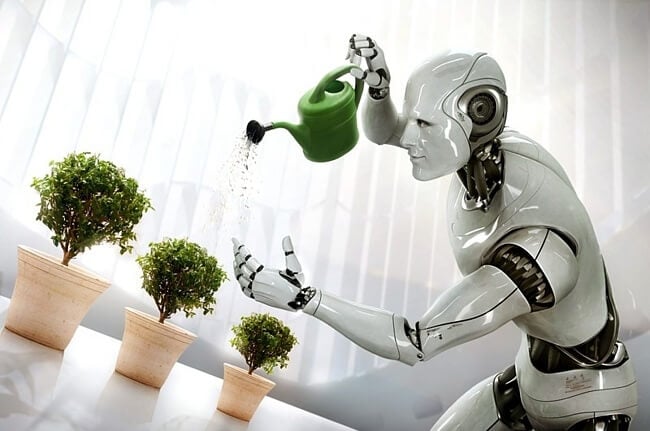Someday, a robot could be your boss

I peered into the future of the workplace, my friends, and came away with both bad and good news.
The bad news is there’s a very good chance that by 2018, some of you will be fired by a robot.
The good news is you’ll be able to tell people that you were fired by a robot, which, quite frankly, is such a good story that it might be worth getting fired over.
Technology research and advisory firm Gartner recently released a report called “Top Strategic Predictions for 2016 and Beyond: The Future Is a Digital Thing.” (The Future Is a Digital Thing is also the name of my underground techno band.)
The company’s analysts predict how smart machines will change the way we comparably simple humans function at work, and they use ominous phrases like “dramatic rise of smart machines and autonomous devices” and “urgent need to define and develop harmonious relationships between people and machines.”
Gulp.
The report is actually quite fascinating, and it hints at issues we would be wise to consider before the predictions become reality.
For example, the Gartner analysts believe that by 2018, “6 billion connected things will be requesting support.” That means companies that provide support services will have to start viewing things — like smart machines — as customers.
Per the report: “They will need to develop mechanisms for responding to significantly larger numbers of support requests communicated directly by things. They will also need to develop strategies for responding to them that are distinctly different from traditional human customer communication and problem solving.”
There are other interesting prognostications, like one that says 20 percent of all business content will soon be authored by machines. (I assure you, this column was written by a locally sourced, 100 percent organic human. Bleep blorp.)
But the item I found the most interesting/terrifying was this: By 2018, more than 3 million workers globally will be supervised by a “robo-boss.”
Consider this: “Supervisory duties are increasingly shifting into monitoring worker accomplishments through measurements of performance that are directly tied to output and customer evaluation. Such measurements can be consumed more effectively and swiftly by smart machine managers tuned to learn based on staffing decisions and management incentives. … Robo-bosses will depend on data directly derived from worker performance and on their own ability to derive insights from that data that a human might not reach, or might reach less quickly.”
A robo-boss would be capable of evaluating a person’s performance without bias, basing its conclusions solely on quantifiable data. That strips away our humanity and overlooks the skills we possess that can’t be quantified. But it would likely do a better job than a human of analyzing the measurable aspects of our performance and finding ways we can work better.
The report described it like this: “Measurement of worker performance will become even more granular as smart machines become the primary means of analyzing performance. Activities and events that would be far too minuscule for human managers to track — for example, the angle at which a plate is presented to a diner, the speed at which a driver turns a corner, or the percentage of completeness that a smile reaches in front of a VIP customer — will be fodder for machines capable of uniquely powerful and granular micromanagement.”
It’s easy to see the advantages of this kind of micro-analysis, but it’s also easy to dismiss it as too robotic. It’s one thing for a machine to evaluate another machine and find ways to increase efficiency, it’s another entirely to evaluate a human based on nothing but raw data.
What the report suggests is that allowing smart machines to handle the data side of worker evaluation can free up humans to focus on — you guessed it — the human side.
“Train managers to focus on ‘human’ issues, such as creative leadership, worker relations, and strategic planning. Training must focus less on simply measurable worker behaviors and their correlation. Human managers should be given clear instruction on what they can accomplish that machines cannot. The managers themselves should be measured on worker satisfaction with the company, and balancing of performance metrics against the necessities of living. Human managers may be partnered with smart machine managers in a way that allows them to influence the skills and strengths of the machines.”
I bring this up because it hints at the need for balance. Companies today are paying much closer attention to workers as human beings, recognizing the need to put people in positions where they feel happy and engaged and, in turn, do their best work.
But companies will always be tempted to use technology to more thoroughly evaluate how their workers are performing. As zany as the term “robo-boss” sounds, I don’t doubt that the Gartner report’s prediction will come to pass.
That’s why it’s important for companies to look ahead, to consider the efficacy of smart machines and balance that with the needs of human employees.
The report suggests: “We need to be asking ourselves, ‘How smart is smart enough?’ when it comes to software systems and devices. When devices become smart enough to go beyond simple autonomous behavior, to behavior that is less predictive, we open the door to unexpected — and potentially unwanted — results. … Will the rise of smart machine instances in the workforce drive a psychological wedge between businesses and their employees, making them feel increasingly like parts of an all-encompassing business machine?”
The future is never as far off as we imagine. And this particular future is approaching fast.
Better to ask these questions now and be prepared. Before our robo-bosses find such questions illogical and show us the door.
About The Writer
Rex Huppke writes for the Chicago Tribune. Send him questions by email at rhuppke@tribune.com or on Twitter @RexWorksHere.
(c)2015 Chicago Tribune